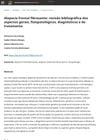67 citations,
January 1997 in “Lancet” Hirsutism is when women have too much hair growth, often due to a bit more androgen hormones and sensitive skin.
8 citations,
September 2005 in “Practical diabetes” PCOS is a condition causing irregular periods, excess male hormones, and infertility, often managed by targeting insulin resistance and specific symptoms.
 August 2023 in “Journal of Clinical Medicine”
August 2023 in “Journal of Clinical Medicine” Metformin lowers prolactin in women without PCOS but not in those with PCOS, where it reduces other hormones instead.
 90 citations,
December 2007 in “Current Oncology”
90 citations,
December 2007 in “Current Oncology” Non-hormonal treatments should be used first for sexual dysfunction in postmenopausal breast cancer patients on aromatase inhibitors, with hormones as a second option.
6 citations,
January 1984 in “PubMed” Spironolactone treatment reduced hair growth and androgen levels in hirsute women, but the overall effectiveness was just adequate.
 400 citations,
January 2014 in “British Journal of Sports Medicine”
400 citations,
January 2014 in “British Journal of Sports Medicine” The consensus provided guidelines for treating the Female Athlete Triad and a system to decide when athletes can return to sports.
 July 2023 in “JAAD International”
July 2023 in “JAAD International” Two drugs, finasteride and minoxidil, are approved for hair loss treatment, but new therapies are being developed.
 59 citations,
August 2021 in “Frontiers in Endocrinology”
59 citations,
August 2021 in “Frontiers in Endocrinology” GLP-1 receptor agonists, like Dulaglutide, Liraglutide, and Semaglutide, have potential benefits beyond the pancreas, including neuroprotection, pain suppression, cardiovascular protection, obesity management, and cancer treatment, but there are concerns about pancreatitis and pancreatic cancer risks.
 27 citations,
May 2019 in “American Journal of Clinical Dermatology”
27 citations,
May 2019 in “American Journal of Clinical Dermatology” Antiandrogen therapy for hidradenitis suppurativa lacks strong evidence and needs more research.
 January 2024 in “Biology of sex differences”
January 2024 in “Biology of sex differences” Dihydrotestosterone makes arteries stiffer in female mice by reducing estrogen receptor expression.
 18 citations,
June 2019 in “Clinical research in dermatology”
18 citations,
June 2019 in “Clinical research in dermatology” Acne can't be cured but can be managed with treatments like benzoyl peroxide and diet changes; it's costly and can lead to scarring and mental health issues.
 2 citations,
April 2023 in “Pharmaceuticals”
2 citations,
April 2023 in “Pharmaceuticals” Testosterone therapy for postmenopausal women appears safe and may protect against heart disease, but requires constant monitoring and more research for long-term effects.
 2 citations,
January 2021 in “Cureus”
2 citations,
January 2021 in “Cureus” Long-term anabolic steroid use can lead to heart and metabolic health issues.
 May 2024 in “Brain disorders”
May 2024 in “Brain disorders” Agmatine may help reduce seizures linked to hormone changes in female rats.
466 citations,
June 2009 in “Experimental dermatology” We now understand more about what causes acne and this could lead to better, more personalized treatments.
 19 citations,
December 2021 in “Endocrine Reviews”
19 citations,
December 2021 in “Endocrine Reviews” There are various effective hormone treatments for puberty induction in boys and girls with hypogonadism, and starting treatment early is important.
 2 citations,
March 2023 in “Experimental neurology”
2 citations,
March 2023 in “Experimental neurology” Pregnenolone might help manage movement issues caused by Parkinson's disease treatment without reducing the medicine's effectiveness.
1 citations,
November 2023 in “Medicina” Hormone therapy improves mental well-being in transgender individuals but requires ongoing health monitoring.
11 citations,
January 2018 in “International Journal of Trichology” The true incidence of post-Finasteride syndrome is unclear, and more research is needed.
 4 citations,
December 2021 in “Experimental and Therapeutic Medicine”
4 citations,
December 2021 in “Experimental and Therapeutic Medicine” Adult female acne is complex and requires a combination of treatments for effective management.
 9 citations,
February 2022 in “Biomolecules”
9 citations,
February 2022 in “Biomolecules” Drinking a lot of alcohol increases the risk of prostate cancer and can worsen the condition.
1 citations,
January 2020 in “Bioscience Reports” Long-term use of finasteride in women can cause hormonal changes, DNA damage, and menstrual issues.
 90 citations,
May 2019 in “Drugs”
90 citations,
May 2019 in “Drugs” Long-term use of azole antifungals can cause hair loss, hormonal imbalances, and severe skin reactions.
 December 2024 in “Brazilian Journal of Health Review”
December 2024 in “Brazilian Journal of Health Review” Early diagnosis of alopecia frontal fibrosante is crucial, but treatment remains controversial and varies.
 August 2021 in “Annals of Agricultural and Environmental Medicine”
August 2021 in “Annals of Agricultural and Environmental Medicine” The article concludes that understanding Frontal Fibrosing Alopecia (FFA) is crucial for effective treatment, which includes medication like 5α-reductase inhibitors and hydroxychloroquine.

research Acne
81 citations,
January 2002 in “American journal of clinical dermatology” Hormonal treatments can help with acne, especially in women, by lowering androgen levels or blocking their effects.
 May 2006 in “Women's Health Medicine”
May 2006 in “Women's Health Medicine” Excessive hair growth in women, often from high androgen levels, is usually caused by PCOS, and can be treated with hair removal, medication, and possibly weight loss.
 4 citations,
July 2017 in “Medicine”
4 citations,
July 2017 in “Medicine” The document concludes that managing PCOS involves lifestyle changes, medication for symptoms, and weight loss for fertility improvement.
 1 citations,
September 2013 in “Fertility and Sterility”
1 citations,
September 2013 in “Fertility and Sterility” Finasteride discontinuation increases sperm count in men.
 January 2018 in “Springer eBooks”
January 2018 in “Springer eBooks” The document says that early treatment of Acne Vulgaris is important to prevent scarring and that adult onset acne is common in women, often due to hormonal imbalances.






















